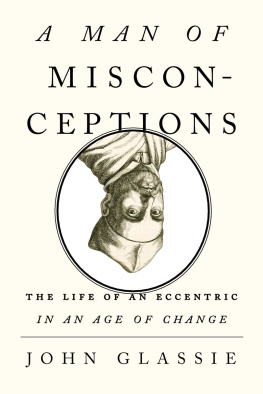A Man of Misconceptions
THE LIFE OF AN ECCENTRIC IN AN AGE OF CHANGE
John Glassie
R IVERHEAD B OOKS
a member of Penguin Group (USA) Inc.
New York
2012

RIVERHEAD BOOKS
Published by the Penguin Group
Penguin Group (USA) Inc., 375 Hudson Street, New York, New York 10014, USA Penguin Group (Canada), 90 Eglinton Avenue East, Suite 700, Toronto, Ontario M4P 2Y3, Canada (a division of Pearson Penguin Canada Inc.) Penguin Books Ltd, 80 Strand, London WC2R 0RL, England Penguin Ireland, 25 St Stephens Green, Dublin 2, Ireland (a division of Penguin Books Ltd) Penguin Group (Australia), 707 Collins Street, Melbourne, Victoria 3008, Australia (a division of Pearson Australia Group Pty Ltd) Penguin Books India Pvt Ltd, 11 Community Centre, Panchsheel Park, New Delhi110 017, India Penguin Group (NZ), 67 Apollo Drive, Rosedale, Auckland 0632, New Zealand (a division of Pearson New Zealand Ltd) Penguin Books (South Africa), Rosebank Office Park, 181 Jan Smuts Avenue, Parktown North 2193, South Africa Penguin China, B7 Jiaming Center, 27 East Third Ring Road North, Chaoyang District, Beijing 100020, China
Penguin Books Ltd, Registered Offices: 80 Strand, London WC2R 0RL, England
Copyright 2012 by John Glassie
All rights reserved. No part of this book may be reproduced, scanned, or distributed in any printed or electronic form without permission. Please do not participate in or encourage piracy of copyrighted materials in violation of the authors rights. Purchase only authorized editions. Published simultaneously in Canada
constitutes an extension of this copyright page.
Library of Congress Cataloging-in-Publication Data
Glassie, John.
A man of misconceptions : the life of an eccentric in an age of change / John Glassie.
p. cm
Includes bibliographical references and index.
ISBN 978-1-101-59703-3
1. Kircher, Athanasius, 16021680. 2. ScientistsGermanyBiography. 3. IntellectualsGermanyBiography. 4. Eccentrics and eccentricities GermanyBiography. 5. GermanyHistory16181648Biography. 6. GermanyHistory16481740Biography. 7. ScienceGermanyHistory17th century. 8. GermanyIntellectual life17th century. I. Title.
CT1098.K46G53 2012 2012026023
943'.041092dc23
[B]
While the author has made every effort to provide accurate telephone numbers and Internet addresses at the time of publication, neither the publisher nor the author assumes any responsibility for errors, or for changes that occur after publication. Further, the publisher does not have any control over and does not assume any responsibility for author or third-party websites or their content.
For Natalie
CONTENTS
Let us not, in the pride of our superior knowledge, turn with contempt from the follies of our predecessors.... He is but a superficial thinker who would despise and refuse to hear of them merely because they are absurd.
Charles MacKay,
Memoirs of Extraordinary Popular Delusions and the Madness of Crowds, 1852 edition
APOLOGETIC FORERUNNER TO THIS KIRCHERIAN STUDY
S ometime in the early 1670s an old Jesuit priest named Athanasius Kircher began to write a remarkable account of his early life. It told how, by virtue of divine intervention and his own bright mind, hed come out of nowhere (a small town in the forested region of what is now central Germany) and survived stampeding horses, a painful hernia, and the armies of an insane bishop, among other things, to take his place as one of the intellectual celebrities of the seventeenth century.
As a general rule Kircher never ruined a good story with facts. Although well-known for more than thirty seat-cushion-size books on almost as many subjects, and for an apparent knowledge of almost everything, he was also known for a tendency to embellish on his own behalf. (The other frequent complaint against him was more like the opposite: people said he was inclined to believe any spectacular story he heard.) His uncharacteristically slim autobiography, written either in his bedchamber off a college courtyard in Rome or at a mountainside retreat called Mentorella, certainly included as many exaggerations and omissions as great escapes and miraculous recoveries, but the main story he told was true.
In many cases the truth is even more remarkable than Kircher was willing to let on. He doesnt come out and say, for example, that he first gained the attention of the learned elite in the early 1630s, at least in part, by claiming to own a clock that was powered by a sunflower seed and a mystery-solving manuscript written by an Arab rabbi. Unfortunately for Kircher, by the time he died in 1680, his stature was fading. After his death, for the most part, until a recent revival of interest in this baroque polymath, the custom was to either scoff or avoid discussing him altogether. It is not the writers intention to enter into the vast and terrifying subject of Athanasius Kircher, one art historian assured his readers when, in the middle of a 1972 paper on Jesuit architecture, he found himself in the vicinity.
Vast is an appropriate word because Kirchers curiosity and intellectual pursuits were almost unfathomably widespread. He was genuinely and insatiably curious about the world around him, and from his established place at the Collegio Romano, the flagship institution of his order in Rome, he threw himself into the study of everything from light to language to medicine to mathematics. In his museum at the Collegio he not only displayed antiquities, artifacts, and curiosities from around the world (amassed with the help of Jesuit missionaries), but also demonstrated his own magic lanterns, speaking statues, vomiting devices, and, as legend has it, a single cat piano.
Kirchers museum at the Collegio Romano
This was the kind of man who pursued his interest in geological matters by lowering himself down into the smoking crater of Mount Vesuvius. He spent decades trying to decipher the hieroglyphic texts of ancient Egypt because he believed, along with many others, that they contained mystical wisdom passed down from the time of Adam. He examined all aspects of music and acoustics, and experimented with an algorithmic approach to songwriting. He was among the first to publish a description of what could be seen through a microscope.
Kircher was so prolific and so ingenious that he might have been remembered as a kind of seventeenth-century Leonardo. The problem was that he got so many things wrong, and this is also where the terrifying part comes in. Many of Kirchers actual ideas today seem wildly off base, if not simply bizarre. Contrary to Kirchers thinking, for instance, there is nothing occult or divine about magnetism. There is no such thing as universal sperm. And there is no network of fires and oceans leading to the center of the Earth. Its fair to say that from the viewpoint of modern science Kircher has been something of a joke.
Of course, modern science didnt exist in 1602, when Kircher was born, but he lived right through the age in which it began. The story of the so-called scientific revolution, a term that was coined only in the twentieth century, is already a clich, in which magic and superstition were subdued by rational minds and the experimental method. For people who lived then, it was a lot more complicated than that. But there does seem to be a consensus that what transpired during the seventeenth century, give or take a few decades, somehow explains how we became modern, how we became who we are.
















